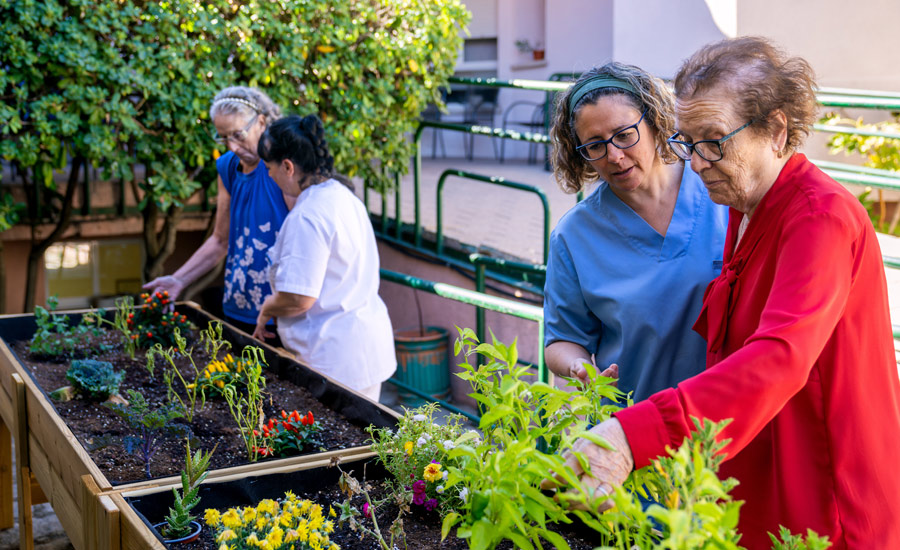Supporting Residents With Dementia With Structured Activities in Care Homes

For a loved one living with dementia, joining group activities can become more challenging as the condition progresses. But, with the right support, many residents with dementia can still participate in a manageable way.
In this article, we will discuss how care homes keep activities a meaningful part of daily life and how they are carefully adapted to suit different stages of dementia.
Can Residents with Dementia Still Take Part in Group Activities?
Yes. Many residents with dementia can continue to take part in group activities, but sessions must be adapted to their level of ability and stage of the condition. Care home staff will use smaller groups, clear structure and familiar routines, bringing comfort and involvement to residents. Activities such as music, light exercise classes, reminiscence therapy and arts are commonly used to support mood, reduce anxiety and encourage connection.
Group Life After a Dementia Diagnosis
Living with dementia can make it harder for your loved one to take part in group sessions, but that doesn’t mean they’re no longer possible. With the proper support, many residents continue to join in, particularly when the activity is familiar and the setting feels calm.
In most care homes, structured group sessions are part of everyday life, including music, gentle movement, conversation prompts or themed activities, making an effort to include cultural or religious elements that are important to the resident. What matters is that they’re planned with the resident in mind – clear, consistent and low pressure.
For many, the benefit is as much about the routine as the activity itself. Seeing familiar faces, hearing a regular piece of music or knowing when something happens can help reduce confusion and make the day feel more manageable.
The Alzheimer’s Society links regular, meaningful activity and improved well-being in dementia care. In practice, that might mean your relative feels less agitated, more alert or more settled in the following hours.
Taking part might look different from person to person. Some will join in actively and others may prefer to sit nearby. Either way, they’re still included, and that’s what matters.
How Group Activities Are Adapted at Each Stage of Dementia
Group activities can still be part of daily life at every stage of dementia, they just need to be adjusted to match what your loved one can manage.
Early Stage
In the early stages of dementia, many residents can still have some independence and follow routines and take part in familiar group activities. Sessions with a clear structure and a social element often work well.
This might include:
- Light exercise or movement to music
- Discussion groups with visual prompts
- Card games or simple quizzes
- Small group baking or craft sessions
Middle Stage
As the condition progresses, attention and memory become more affected. Activities now need to be shorter, more repetitive and supported more closely.
Group sessions might involve:
- Singing well-known songs
- Handling familiar objects
- Painting or colouring with support
- Reminiscence sessions using photos or memory boxes
Later Stage
In the later stages of dementia, activities are often less about doing and more about sensing or simply being present. Activities shift to comfort, calm and gentle interaction.
At this point, staff might use:
- Calming music or soft background sounds
- Hand massage or holding a textured object
- Watching slow-moving visuals, like water patterns or light projections
- One-to-one support within a quieter group
How Staff Support Group Activities Day to Day
Most group sessions in care homes don’t run exactly the same way twice. That’s because staff adjust them based on how residents are feeling, how focused they are and what kind of support is needed that day.
Simple and steady work best
Activities are broken into steps and instructions are kept short, which is incredibly helpful for residents with dementia. Staff speak clearly and give time for things to sink in. If the session feels familiar, for example, same time, same setting, it’s often easier for your loved one to take part.
Staff notice the small things
If a resident seems confused or unsettled, they’ll quietly offer reassurance or suggest a simpler role. Sometimes, just sitting nearby is enough.
Who’s in the room matters
Staff will think about who’s likely to enjoy the same pace or topic and who might prefer a smaller group. It’s not always perfect, but when the balance is right, residents are more likely to stay engaged.
The setting makes a difference
Background noise, lighting and layout are taken into consideration. Staff set the room up so it’s calm, easy to move around and not too busy visually. A few quiet adjustments often make it easier for your relative to focus on what’s happening in front of them.
Keeping Residents With Dementia Involved
Group activities can still be part of daily life for your loved one, even with a dementia diagnosis. What they participate in might change over time, and some days may be quieter than others, but inclusion still matters.
When the setting is calm and the activity is well supported, it can bring comfort, connection and a sense of routine, ensuring your loved one feels involved in a way that works for them.
Ready to explore...
